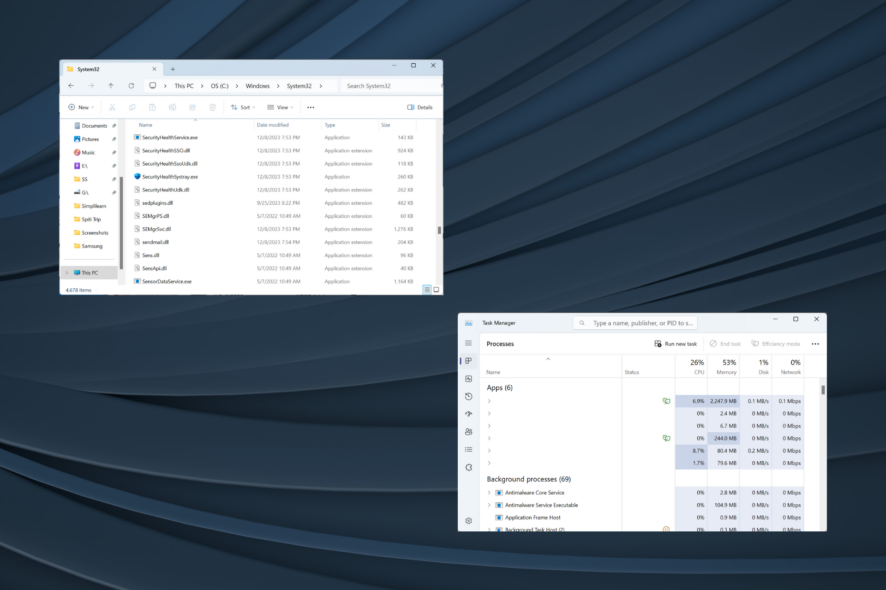Is SECOCL.exe Safe and How to Fix High CPU Usage [Answered]
Run a malware scan to verify the authenticity


3 min. read


Updated December 11th, 2023


Published December 11th, 2023
Readers help support Windows Report. When you make a purchase using links on our site, we may earn an affiliate commission.


Read the affiliate disclosure page to find out how can you help Windows Report effortlessly and without spending any money. Read more
Key notes
- SECOCL.exe is not a core Windows process but comes pre-installed by the OEM and is usually safe.
- If it takes up a high CPU, terminate the process or update the drivers.
- Keep reading to find out more about SECOCL.exe and tested ways to fix the high CPU usage!


FILE
The SECOCL.exe file has been troubling many, given that the file’s name or properties don’t state the intended purpose and there’s not much information available on the web.
Also, for many users, SECOCL.exe showed a high CPU usage in the Task Manager, generally in the range of 20-50%, and got the computer fan running at a higher speed.
What is SECOCL.exe?
The process is completely safe and linked to the Sound Research SECOCL software found on some HP and Asus devices. It’s stored in: C:WindowsSystem32
The software also has a dedicated Sound Research SECOMN Service that usually triggers the SECOCL.exe process.
How do I fix SECOCL.exe’s high CPU usage?
Before we start with the slightly complex solutions, try these:
- Check for any pending Windows updates and install them.
- Update the BIOS.
1. Terminate the SECOCL.exe process
- Press Ctrl + Shift + Esc to open the Task Manager.
- Scroll down, locate the SECOCL.exe process, right-click on it, and click the End task button.


2. Update the drivers
- Press Windows + X to open the Power User menu, and select Device Manager from the list of options.
- Locate all the Realtek entries, right-click on them individually, and select Update driver.


- Click on Search automatically for drivers and wait for Windows to install the best one available locally.


- If a newer version is installed, restart the computer.
To fix SECOCL.exe’s high CPU usage, update the Realtek drivers on the PC. If Windows can’t find an update, check the manufacturer’s website and manually install the latest driver.
For some users, updating the graphics driver also helped reduce CPU usage. So, try that!
3. Disable the Sound Research SECOMN Service
- Press Windows + R to open Run, type services.msc in the text field, and hit Enter.
- Scroll down, right-click on the Sound Research SECOMN Service, and select Properties.


- Choose Disabled from the Startup type dropdown menu, then click on the Stop button under Service status.


- Click Apply and OK to save the changes, then restart the PC and check for improvements.
4. Reset Windows
When nothing else works, you can always reset Windows to factory defaults. This will wipe out all the stored files and installed apps. After a reset, the computer reverts to the state you first got it in.


We recommend you move the critical files to an external USB storage or use an effective data backup solution. This was, you can restore these files after the reset.
Can I delete SECOCL.exe?
We recommend against deleting SECOCL.exe. If you are keen on doing that, first, move the file to another folder. This way, Windows is unable to load the process. Now, check for any adverse effects on the PC’s audio input or output.
And if everything is fine after changing the SECOCL.exe’s location, you can safely delete it. As a precautionary measure, create a restore point first.
Remember, SECOCL.exe is not the only process that triggers such issues. We have come across high CPU usage by OmenCap.exe, and a similar approach helps!
Before you leave, discover some quick tips to improve the PC’s performance and enjoy faster loading speeds.
For any queries or to share what worked for you, drop a comment below.







